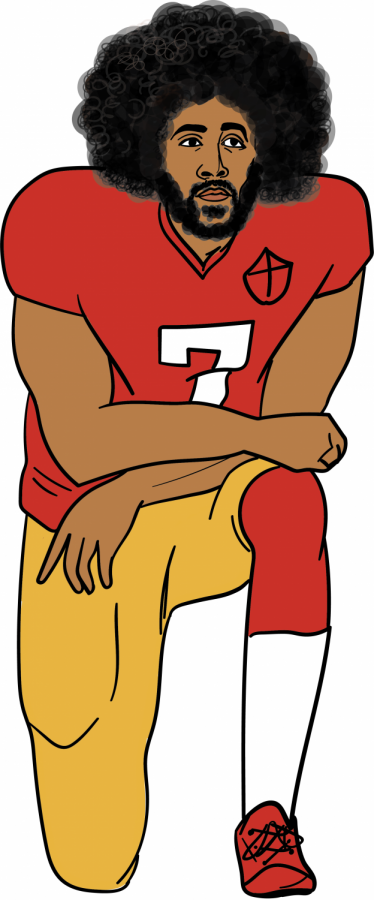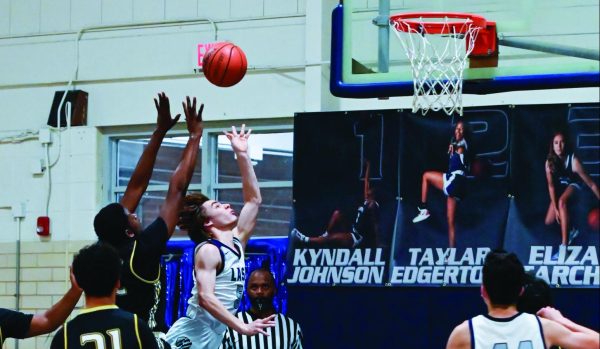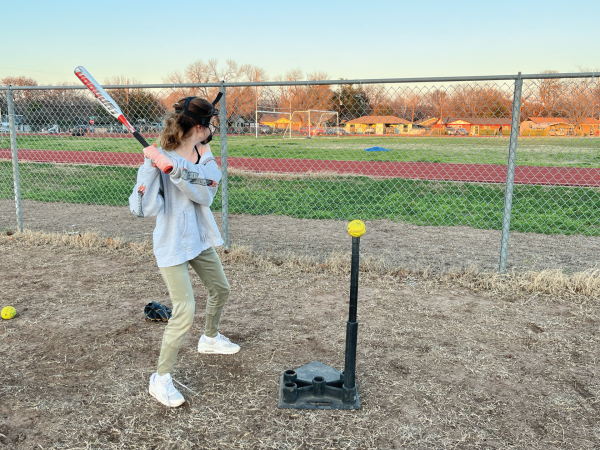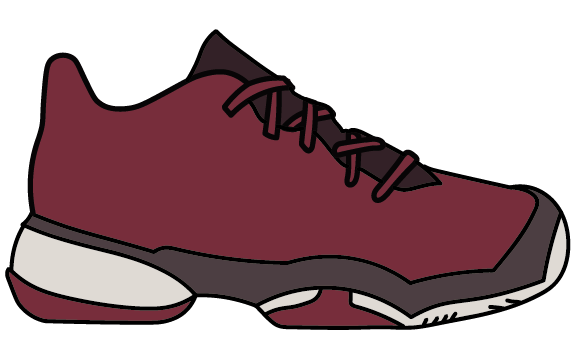NFL Under Fire Over Failure to Address Inequality Within the League
October 2, 2020
On Sept. 2, 2016, San Francisco 49ers quarterback Colin Kaepernick first kneeled during the national anthem as a way to protest racial inequality in America. Kaepernick made it clear that he would not stand for a country that oppresses people of color. Since then, the National Football League (NFL) has come under public scrutiny for not only refusing to support Kapernick but for not backing the Black Lives Matter movement as a whole.
Recently, players throughout the NFL have kneeled during games and spoken out about the NFL’s silence on racial inequalities in the league. 70% of the players in the NFL are Black while those in power are not, so the NFL’s lack of support of the Black Lives Matter movement has caused tension between the players and the leaders in the league.
The NFL has been called out for their stance on issues of race multiple times in the past few years. Commissioner Roger Goodell said in 2016 that he didn’t agree with Kaepernick’s actions and received criticism from players and fans, and after their recent silence, they have received even more backlash.
Kneeling as a form of protest began when Martin Luther King Jr. and others knelt in prayer during a protest in Selma, Ala. King fought fiercely for equal civil rights throughout the 1960s and is a symbol of freedom and equality for people of color.
Although Kaepernick left the NFL after suffering multiple injuries, players continued to kneel during the national anthem. By 2019, only three players were seen kneeling—free agent Eric Reed, Houston Texans wide receiver Kenny Stills, and Miami Dolphins wide receiver Albert Wilson.
Over the last four years, Kaepernick’s protests in the NFL started to fade, but in the last four months, larger protests began across the country which prompted a response from the NFL. As people came together to protest against the death of George Floyd and other victims of police brutality, many NFL players protested themselves, utilizing their platforms to speak out against the NFL for not making a statement about racial inequality within the league.
A group of players including Kansas City Chiefs quarterback Patrick Mahomes, Houston Texans quarterback Deshaun Watson and New York Giants running back Saquon Barkley joined together to make a video asking the NFL to acknowledge their mistreatment of Black players and their dismissiveness of Kaepernick’s peaceful protest. The next day, Goodell released a video apologizing for not standing with the players and declaring that the NFL is in fact against police brutality and racism and that they stand with their Black players. However, some players were not satisfied with the response because Goodell did not mention Kaepernick’s protests.
One of the inequalities that stands out is the lack of Black representation in positions of power within the NFL, which is contrasted by the number of Black players in the league. Out of all 32 teams in the NFL, only two are owned by people of color—Buffalo Bills co-owner Kim Pegula and Jacksonville Jaguars owner Shahid Khan.
When it was announced that the NFL would return for a 2020 season, fans were interested to see how the NFL would show their support for Black players. The NFL put slogans in the end zones of every stadium that read “End Racism” or “It Takes All of Us,” and they announced that “Lift Every Voice and Sing” by J. Rosamond Johnson and James Weldon Johnson would be played before every Week One game. “Lift Every Voice and Sing” has been referred to as the “Black national anthem” by the NAACP and is a symbol of encouragement and unity for the Black community.
The first game of the season was in Kansas City as the defending Super Bowl champions, the Kansas City Chiefs, faced off against the Houston Texans.
The Texans decided to stay in their locker room for both anthems because, not unlike Kaepernick’s protests in 2016, they did not want to so publicly show support for an anthem that didn’t represent them. After they came onto the field, all of the players from both teams linked arms and stood across the field. The players’ actions were met by boos from the Kansas City fans.
This isn’t the first time that fans have shown dislike for NFL players using their platform to bring about change. In Buffalo, N.Y., Kaepernick had bottles thrown at him when he took a knee, and Stills has been met with boos after kneeling in Houston.
It’s interesting to look at how the NFL has responded to accusations of racial negligence so differently based on what is going on in America. In 2016, the NFL turned a blind eye to the protests going on in their league and didn’t support the players who were taking a stand. However, now that America is scrutinizing their every move, the NFL has finally taken a stand and spoken up for their players.
Due to the responses from fans and players, the NFL has been working with the NFL Players Association to find ways to support the players in their fight against racism and police brutality. The NFL announced in a memo sent to all teams that they are considering putting the names of those who were killed by police brutality on players’ helmets.
Additionally, the NFL pledged to donate $250 million dollars through their Inspire Change program to help combat racism. Inspire Change was founded in 2018, and they have donated to over 20 civil rights groups such as Success for All, an educational program, and the Anti-Recidivism Coalition, which works to support incarcerated individuals.
Historically, the NFL has had a reputation for neglecting Black players and social inequality in the country. However, the recent social justice movement and increased unrest within the NFL has forced them to take a stand, and what they continue to say in the future will make all the difference.











